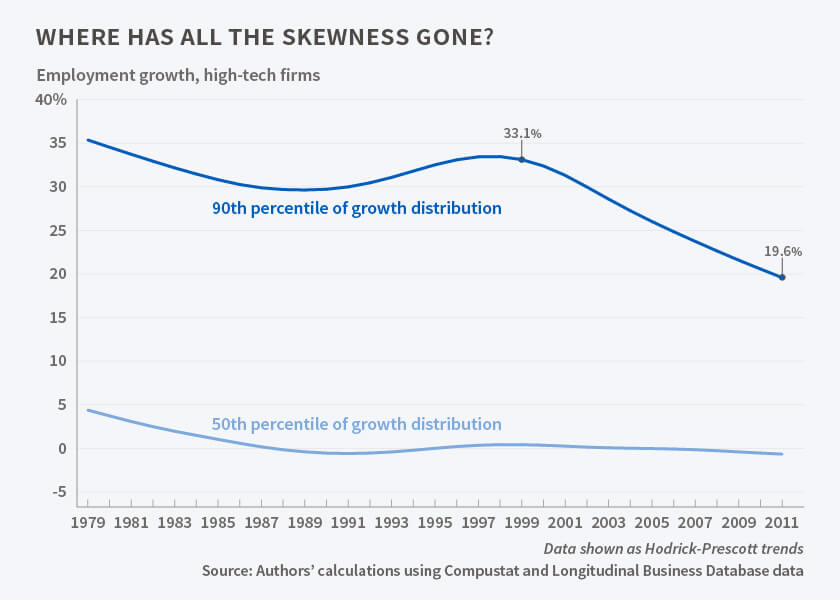Ricochet is the best place on the internet to discuss the issues of the day, either through commenting on posts or writing your own for our active and dynamic community in a fully moderated environment. In addition, the Ricochet Audio Network offers over 50 original podcasts with new episodes released every day.
 Where Are the Startups? Maybe the GOP 2016ers Should Start Talking About this Chart
Where Are the Startups? Maybe the GOP 2016ers Should Start Talking About this Chart
Perhaps the next Republican debate will finally have a lengthy, serious debate on economic policy. Really hasn’t happened yet as far as I am concerned. Let’s see the Final Five — Trump, Kasich, Cruz, Bush, Rubio — compare and contrast tax plans, higher-ed reform, fixing Medicare and Social Security, and how immigration can be made to better serve economic growth and worker incomes. I would also love to ask them all about flattish productivity growth since the Great Recession. Amazingly — given that — there has been little or no talk about this apparent problem, via a handy NBER summary:
The number of start-up firms in the United States has been declining in recent decades. Prior to 2000, the employment effects of this decline were partly offset by the presence of a small number of high-growth young companies. That pattern seems to have changed.
In Where Has All the Skewness Gone? The Decline in High-Growth (Young) Firms in the U.S., Ryan A. Decker, John Haltiwanger, Ron S. Jarmin, and Javier Miranda show that the general decline in new firms has been accompanied, since around 2000, by a corresponding decline in the number of high-growth start-ups.These trends suggest that startups contributed less to U.S. job creation in the post-2000 period than they did in earlier decades, but the researchers cannot yet explain the dynamic. … Among potential explanations are credit constraints, rising investments in equipment that reduce the need for new employees, outsourcing of work to developing countries, and larger companies acquiring younger firms at an earlier stage of development. …
“Historically, the U.S. has exhibited a high pace of entrepreneurship with a small share of fast growing young firms disproportionately accounting for job creation and productivity growth,” they conclude. “The decline in startups and the accompanying decline in high growth young firms either suggests adverse consequences for U.S. economic growth or a change in the way that such growth will be achieved.”
The number of start-up firms in the United States has been declining in recent decades. Prior to 2000, the employment effects of this decline were partly offset by the presence of a small number of high-growth young companies. That pattern seems to have changed.
I have written about the interplay of entrepreneurship, startups, Silicon Valley, and innovation in a number of posts:
Is America’s entrepreneurial engine roaring or sputtering?
Where are all the startups? More on America’s economic calcification
US startups aren’t creating jobs like they used to
Declining US business dynamism: Where are all the startups?
Another promising startup, regulated out of business
Surging Silicon Valley — in 5 charts
A top Silicon Valley investor has written a bold essay in praise of income inequality
Published in Culture, Economics




Perhaps the drumbeat of ‘business is evil’ and ‘you didn’t build that’ coupled with high taxes and crippling regulation has finally paid off for the ‘progressives.’ They are killing capitalism by getting people to voluntarily not become capitalists.
Which – via the attached data on sourses of wealth – couples nicely with income inequality.
http://www.zerohedge.com/news/2016-02-11/if-you-want-be-wealthy-dont-buy-house-build-business
Republicans would only be preaching to the choir. Democrats have convinced Americans that people who own businesses are evil. They use the term “job creator” in mockery.
So yes, Republicans could talk about this. But who would break through the Democrats’ brainwashing?
Pretty much.
It’d be interesting to see what the line looks like in the decades prior to 1979. It seems to start much higher that at any point after 1979 ever reaches. How far back does that trend go?
Not even a mention of taxes, regulation, and student debt?